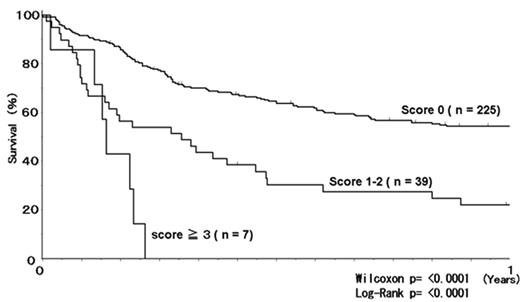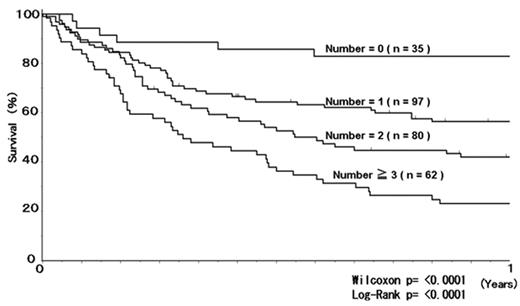Abstract
BACKGROUND: Despite recent advances, mortality rates after allogeneic hematopoietic cell transplantation remain high and cannot accurately predicted.
PURPOSE: To determine the value of pretransplant factors in predicting all-cause mortality during first 1 year after allogeneic HCT.
PATIENTS AND METHODS: A retrospective review of 303 consecutive allogeneic hematopoietic cell transplants was performed with attention to mortality and pretransplant factors in three hematopoietic cell transplantation centers between 2000 and 2005 in Japan. Patients underwent transplantation from sibling (n=200) or unrelated donors (n=104) with myeloablative (n=188) or nonmyeloablative conditioning (n=116). Pretransplant factors and the hematopoietic cell transplantation-specific comorbidity index (HCT-CI: Sorror et. al.) were assessed with general linear model (GML) analysis.
RESULTS: Mortality before 1 year occurred in 145 of 303(48.3%) transplant recipients. The number of prior chemotherapy regimens and the HCT-CI were found to be useful predictors of early mortality. Kaplan-Meier estimates of survival as stratified by the HCT-CI (Fig.1) and the number of prior chemotherapy (Fig.2). The HCT-CI were useful for predicting outcomes. However, the sample size of patients with scores of 1 or more, captured by the HCT-CI did not exceed 15%. Futher, the number of prior chemotherapy regimens showed better suvival prediction.
CONCLUSION: The number of prior chemotherapy regimens will be a promising tool to identify patient at risk for all-cause mortality during first 1 year after allogeneic HCT.
Author notes
Disclosure: No relevant conflicts of interest to declare.



This feature is available to Subscribers Only
Sign In or Create an Account Close Modal